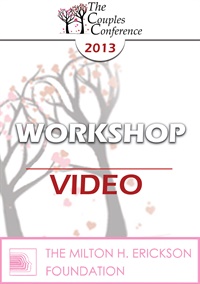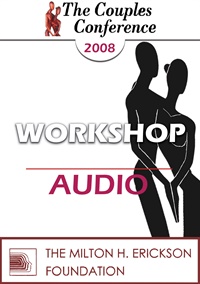
- Average Rating:
- Not yet rated
- Topic Areas:
- Workshops | Conflict | Couples Therapy | Trauma
- Categories:
- Couples Conference | Couples Conference 2008
- Faculty:
- Peter Pearson, PhD
- Duration:
- 2:19:30
- Format:
- Audio Only
- Original Program Date:
- Apr 27, 2008
- Short Description:
- High conflict and chronically distresses add to each others’ trauma while triggering historical trauma. Reducing, calming or eliminating the emotional triggers is an essential part of changing their negative ingrained patterns. See a live demonstration and/or experience a process to bring about immediate relief of painful memories (and sometimes) not even having to talk about them.
- Price:
- $15.00 - Base Price
Tags: Conflict Couples Therapy Trauma
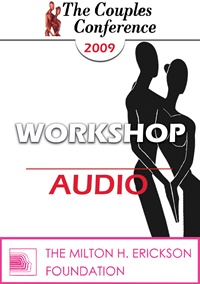
- Average Rating:
- Not yet rated
- Topic Areas:
- Workshops | Affairs | Couples Therapy | Trauma
- Categories:
- Couples Conference | Couples Conference 2009
- Faculty:
- Janis Abrahms Spring, PhD, ABPP
- Duration:
- 1:39:23
- Format:
- Audio Only
- Original Program Date:
- May 02, 2009
- Short Description:
- This workshop will give you a language to help hurt parties normalize the profound sense of psychological loss they experience after an affair. It also will spell our exactly what unfaithful partners can do to earn forgiveness and what hurt partners can do to help foster forgiveness.
- Price:
- $15.00 - Base Price
Tags: Affairs Couples Therapy Trauma
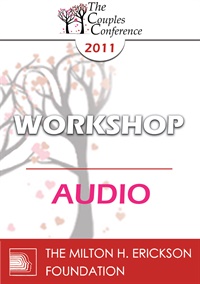
- Average Rating:
- Not yet rated
- Topic Areas:
- Couples Therapy | Post-Traumatic Stress Disorder (PTSD) | Trauma | Workshops | Sex and Sexuality | Gottman Method
- Categories:
- Couples Conference | Couples Conference 2011
- Faculty:
- Julie Gottman, PhD
- Duration:
- 1 Hour 42 Minutes
- Format:
- Audio Only
- Original Program Date:
- Apr 01, 2011
- Short Description:
- Couples therapy is often complicated and delicate when one partner has suffered childhood sexual abuse. The needs of both partners must be honored though one partner’s dream may be the other partner’s nightmare. This workshop describes the details of applying Gottman Method Couples Therapy to a case involving one partner’s history of severe sexual abuse.
- Price:
- $20.00 - Base Price
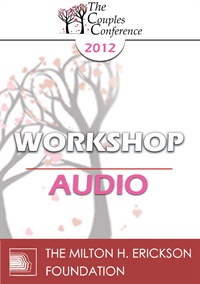
- Average Rating:
- Not yet rated
- Topic Areas:
- Workshops | Communication | Couples Therapy | Narcissism | Personality Disorders | Trauma
- Categories:
- Couples Conference | Couples Conference 2012
- Faculty:
- Ellyn Bader, PhD
- Duration:
- 1:01:18
- Format:
- Audio Only
- Original Program Date:
- Apr 28, 2012
- Short Description:
- Couples come to therapy saying “we can’t communicate.” It sounds simple. Yet what does this really mean? Closer examination often reveals trauma, chronic hostility, narcissistic entitlement, or long-term conflict avoidance. And resolution requires internal self-development that may be resisted by one or both partners. This advanced workshop will use video segments to demonstrate the intricacies of resolving predictable communication breakdowns and supporting couples development.
- Price:
- $15.00 - Base Price
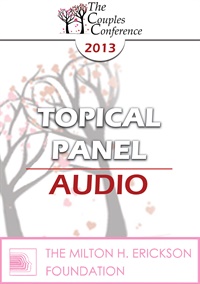
- Average Rating:
- Not yet rated
- Topic Areas:
- Topical Panels | Trauma | Couples Therapy
- Categories:
- Couples Conference | Couples Conference 2013
- Faculty:
- Stephanie Brown, PhD | Bill O'Hanlon, MS | Stephen Porges, PhD
- Duration:
- 1:02:30
- Format:
- Audio Only
- Original Program Date:
- Apr 20, 2013
- Short Description:
- CC13 Topical Panel 02 - Trauma - Stephanie Brown, PhD, Bill O’Hanlon, MS, and Stephen Porges, PhD
- Price:
- $15.00 - Base Price
Tags: Couples Therapy Trauma
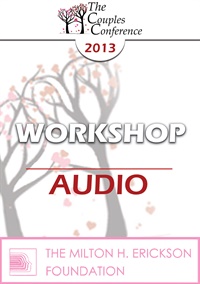
- Average Rating:
- Not yet rated
- Topic Areas:
- Attachment | Trauma | Addiction | Family Therapy | Workshops | Couples Therapy
- Categories:
- Couples Conference | Couples Conference 2013
- Faculty:
- Stephanie Brown, PhD
- Duration:
- 2:00:59
- Format:
- Audio Only
- Original Program Date:
- Apr 19, 2013
- Short Description:
- CC13 Workshop 02 - When Society Loses Control: Attachment, Trauma, and a Developmental Process of Couple and Family Addiction and Recovery - Stephanie Brown, PHD What is the process of “normal” couple and family recovery in the context of cultural loss of control? We will define addiction as a traumatic disorder of attachment for individuals and the family. We will review the Family Recovery Research Project, with an emphasis on the couple, outlining the stages of active addiction and recovery and the key themes and tasks of development that arise, along with the implications for couples therapy at every stage when the culture remains chronically stressed, chaotic and FAST.
- Price:
- $15.00 - Base Price
- Average Rating:
- Not yet rated
- Topic Areas:
- Workshops | Trauma | Couples Therapy | Neuroscience
- Categories:
- Couples Conference | Couples Conference 2013
- Faculty:
- Stephen Porges, PhD
- Course Levels:
- Master Degree or Higher in Health-Related Field
- Duration:
- 1:55:37
- Format:
- Audio and Video
- Original Program Date:
- Apr 21, 2013
- Short Description:
- The workshop will explore how faulty neuroception can have an impact on autonomic regulation and social behavior and how understanding the features that trigger different neuroceptive states (safety, danger, and life threat) can be used as a strategy of treatment.
- Price:
-
Sale is $29.00
price reduced from Base Price - $59.00
Tags: Couples Therapy Neuroscience
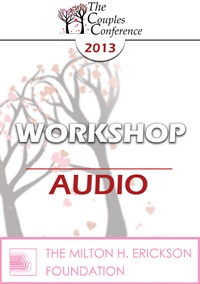
- Average Rating:
- Not yet rated
- Topic Areas:
- Couples Therapy | Workshops | Therapist Development | Trauma
- Categories:
- Couples Conference | Couples Conference 2013
- Faculty:
- Peter Pearson, PhD
- Duration:
- 1:38:55
- Format:
- Audio Only
- Original Program Date:
- Apr 21, 2013
- Short Description:
- Volatile couples come to couples therapy with a fearsome mixture of trauma, devastated dreams, and defensive attitudes. If you ask about their goals or how you can help, you quickly get intense cross complaints, and pressure to fix their partner. Simply trying to understand their problems and asking about their goals can be a toxic beginning as their defensiveness and trauma get re-triggered. This innovative approach is the result of 30 years of seeing couples and searching for a better beginning. In this workshop you will understand how to have each person identify their role in the distress, accept accountability for self-change, identify personal growth changes that are a stretch, create the foundation to work as a team and do it all with a spirit of cooperation and positive strokes. Do all this and more in the first session.
- Price:
- $15.00 - Base Price
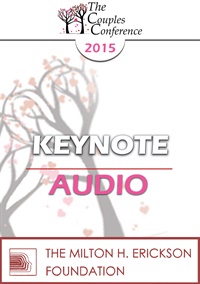
- Average Rating:
- Not yet rated
- Topic Areas:
- Couples Therapy | Keynotes | Trauma
- Categories:
- Couples Conference | Couples Conference 2015
- Faculty:
- Bill O'Hanlon, MS
- Duration:
- 55:33
- Format:
- Audio Only
- Original Program Date:
- Apr 25, 2015
- Short Description:
- Rituals have been used for thousands of years to help people move through difficult developmental times, to move on from problems and stuck places and to grieve and leave trauma behind. In this session, you will discover the two types of rituals that can help couples resolve their issues effectively.
- Price:
- $15.00 - Base Price
Tags: Couples Therapy Trauma
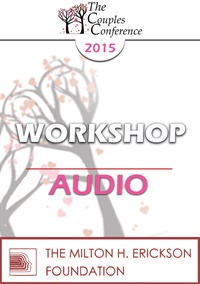
- Average Rating:
- Not yet rated
- Topic Areas:
- Couples Therapy | Workshops | Love | Relationships | Addiction | Sex and Sexuality | Trauma | Attunement | Communication
- Categories:
- Couples Conference | Couples Conference 2015
- Faculty:
- Alexandra Katehakis, MA, MFT
- Duration:
- 1:55:21
- Format:
- Audio Only
- Original Program Date:
- Apr 25, 2015
- Short Description:
- Sex addiction destroys trust in relationships, traumatizing the partner, the sex addict, and the family system. Relational trauma left untreated will have both parties and the entire system crumbling. Attunement, communication, and empathy (ACE) are the three pronged stool that supports the long, and sometimes arduous, journey to restoring trust. The goal is to recognize the signs of relational trauma in both parties, and compare the difference between relational trauma and co-dependence
- Price:
- $15.00 - Base Price
Please wait ...


